
Covered in lush forests, riverside trails and situated in the Appalachian Mountains, it’s no wonder why the stunning state of West Virginia is immortalized in many songs.
Aptly nicknamed the Mountain State, West Virginia is surrounded by natural beauty, steeped in history, and, most importantly for homebuyers, comes with a lower cost of living compared to the rest of the country. If you’re a first-time homebuyer in West Virginia, median home prices sit at about $119,600 – more than half the price of typical U.S. homes, which cost about $269,000.
First-time homebuyers can also make use of a series of statewide and local homeownership programs available across West Virginia to help them with their big purchase. These programs help with much of the heavy lifting from securing a low-interest, fixed-rate mortgage to even covering a portion of your down payment and closing costs. Ultimately, these first-time homebuyer programs could save you tens of thousands of dollars on your home purchase.
Whether you’re homebuying in Charleston or Bluefield or Morgantown – or anywhere in between – read on to learn more about these programs, their eligibility requirements and how to apply.
Who Qualifies as a First-Time Homebuyer in West Virginia?
For a quick clarification, a first-time homebuyer in West Virginia is defined as any family or individual who has never owned a home, or at least not in the past three years depending on the region. Some of the local and statewide programs, for example, suggest residents are still eligible if they haven’t owned a home in the past three years. It’s worth waiting it out if you’re nearing the three-year mark because these programs provide a significant financial boost.
As always, when you’re doing your research, read the fine print and any limitations we list below.
Statewide Homeownership Assistance Programs
Every state has its official housing authority that runs a series of homebuyer programs to help residents with buying a home. In the Mountain State, it’s the West Virginia Housing Development Fund – or WVHDF.
The WVHDF’s slate of programs are tailored to help first-time and repeat homebuyers who fall within income and home purchase price limits. The organization works with over 60 banks, financial lenders and not-for-profit housing agencies that help get the homebuyer initiatives off the ground. Across the board, homebuyers need to complete a homebuyers’ education course, which is a standard prerequisite for these programs.
Here’s a closer look at each program’s details, how to apply as well as the fine print.
WVHDF Homeownership Program
The WVHDF’s Homeownership Program is one of the organization’s flagship initiatives to help make homeownership more affordable. This program is aimed at helping first-time homebuyers or any West Virginians who haven’t owned a home in the past three years, unless you’re purchasing a home in a targeted area.
Essentially, you need to make sure you haven’t owned a home in the past three years prior to the time of closing if you’re buying the following counties: following counties: Barbour, Berkeley, Boone, Brooke, Cabell, Greenbrier, Hancock, Harrison, Jefferson, Kanawha, Marion, Marshall, Mason, Mercer, Monongalia, Morgan, Ohio, Putnam, Raleigh or Wood.
If your county isn’t listed above, it’s in a targeted area in West Virginia.
The Homeownership Program offers eligible homebuyers a 30-year, fixed-rate mortgage. Up to 100 percent of your home’s purchase price can be financed so you don’t need to worry about a down payment. However, down payment and closing cost assistance is available to you. More details on that below.
All single-family homes, townhouses, condominiums and new multi-sectional manufactured homes are fair game. However, the structure must be used as your primary residence, and the lot cannot exceed five acres.
You must complete a homebuyers’ education course for this program. Take a look at course providers available in West Virginia. Keep in mind, you’ll need a minimum credit score of 640.
Also, review the income and purchase price limits organized by county. Income limits range from $65,880 to $113,640 for a two-adult household, for example, while purchase price limits range from $294,600 to $679,847 depending on the county where the residence is located.
Check out the WVHDF website for a closer look at the Homeownership Program, including how to apply and a list of contacts.
WVHDF Movin’ Up Program
Repeat homebuyers gain access to the WVHDF’s Movin’ Up Program, which doesn’t have a first-time homebuyer requirement. Instead, it’s set up to assist families who have outgrown their current home or are ready to trade up but need an extra hand as they move up the property ladder.
The program is nearly identical to the Homeownership Program, providing eligible homebuyers with a 30-year, fixed-rate mortgage, with access to down payment and closing cost assistance.
First-time homebuyers can apply for the Movin’ Up Program, too. Its offshoot, the Movin’ Up Special Program, may be appealing: it offers first-time and repeat homebuyers alike lower interest rates and mortgage insurance premiums if your income is at or below 80 percent of your county’s Area Median Income (AMI).
For the Movin’ Up Program, the statewide income limit is set at $113,760 for a one or two-person household and $132,720 for a household of three of more adults.
All single-family homes, townhouses, condominiums and new multi-sectional manufactured homes are fair game. This time there are no acreage limits, so if you’re a repeat homebuyer, you can move up into a bigger new home.
The same requirements apply; you must have a credit score of at least 640 and complete a homebuyers’ education course.
Check out the full details for the Movin’ Up Program and the Movin’ Up Special.
WVHDF Down Payment and Closing Cost Assistance
If you’ve successfully qualified for a home loan via the Homeownership or Movin’ Up programs, it’s worth your while to apply for down payment and closing cost assistance.
With the Homeownership Program, homebuyers can apply for financial assistance, ranging from $7,500 to $10,000. In the Movin’ Up Program, homebuyers can potentially receive $5,000 to $8,000 to help cover their down payment and closing costs.
This program provides the funding via a 15-year, 2 percent fixed-interest rate second mortgage.
For more details, check out the WVHDF Down Payment and Closing Cost Assistance Program page.
WHEDA’s Advantage program is the organization’s flagship resource, providing 30-year fixed-interest rate home loans with reduced mortgage insurance premiums to save you some extra cash.
The program is available to first-time and repeat homebuyers alike. The requirement is that if you’re buying a property in Wisconsin you’ll use it as your primary residence for the lifetime of your home loan. The Advantage Conventional loan can be used to refinance your home, too.
To qualify, you’ll need to have a credit score of at least 620, and your household must stick to income and purchase price limits. You’ll need to complete a homeownership education program, which is a common prerequisite for state-provided assistance programs for first-time homebuyers.
All single-family homes, condominiums, 2-4 units and double-wide manufactured homes are eligible, too.
You don’t even have to commit to a set percentage for your down payment, unless you’re buying a 2-4 unit, which requires you to put down three percent of your home’s purchase price for your down payment.
You can pair an Advantage Conventional loan with any of WHEDA’s down payment assistance programs, which are outlined below.
Read more about WHEDA Advantage Conventional Loan program, including how to find a participating lender near you to get started with the process.
USDA 502 Direct Loan Program
If a low- or very low-income household is looking to buy a home in rural West Virginia, the WVHDF also helps facilitate the USDA 502 Direct Loan Program. This federal program provides safe and sanitary housing with 100 percent financing and monthly payment assistance to help you cover your mortgage. The amount of monthly assistance is adjusted according to your family’s income.
In order to be eligible, you must stick to income limits set by the USDA. There are also specific guidelines for your home; for example, it can’t be more than 2,000 feet.
The WVHDF has a dedicated USDA 502 Direct Loan Program page for your reference.
Homebuyer Programs by Location in West Virginia
While the WVHDF’s series of statewide programs listed above can give you a leg up on your journey to homeownership with a home loan and down payment assistance, there are local homebuyer programs across West Virginia worth researching, too. In some cases, you can double dip, putting WVHDF’s programs to use alongside local resources.
Read more for our list of local programs.
Charleston
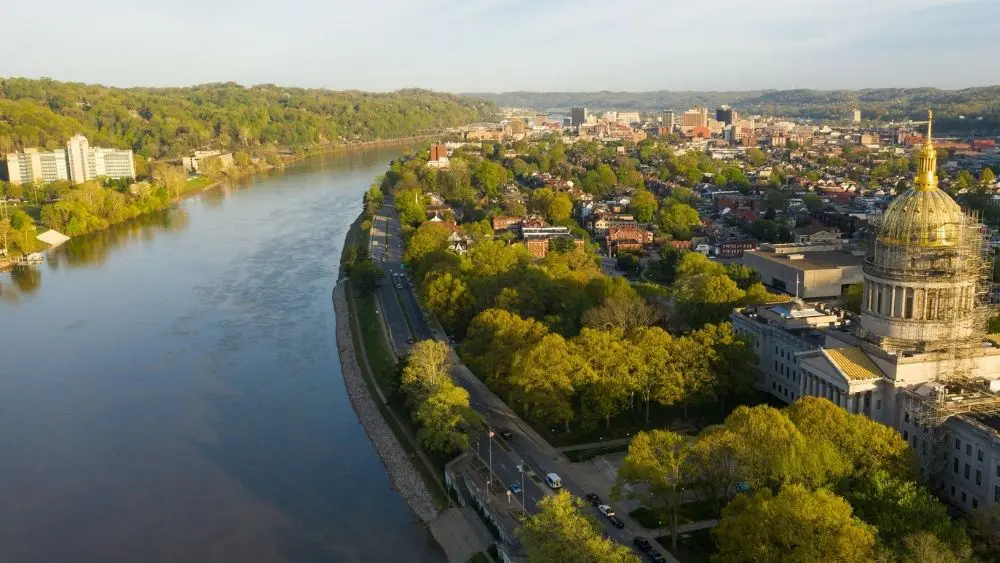
Homebuyers with their sights set on West Virginia’s charming capital city, Charleston, are in luck: the city runs a generous homebuyer assistance initiative called the Home Blend Program, providing eligible families with a 10-year loan that’s forgiven monthly at a zero percent interest rate.
You can apply for a maximum of $25,000 in down payment assistance and $2,000 for closing cost assistance. All in all, that’s up to $27,000 that could be forgiven if you use your home as your primary residence for the next decade. If you sell or move during the 10-year loan period, the remaining loan balance is due.
Home Blend is available only to first-time homebuyers and anyone who hasn’t owned a home in the past three years.
To be eligible, you must qualify for a mortgage on your own and contribute at least $500 towards your home purchase. You must also complete a homebuyers’ education course.
The maximum home loan amount is $128,000 – that should make up 80 percent of your home’s purchase price, while the down payment can be provided via the Home Blend Program.
Household income limits apply too; for example, a two-adult household must earn less than $38,950 per year.
You can check out the full details for the Home Blend Program on the city of Charleston’s website. There’s also an official Home Blend Program brochure that lists the fine print, income and housing price limits and how to apply.
Elkins
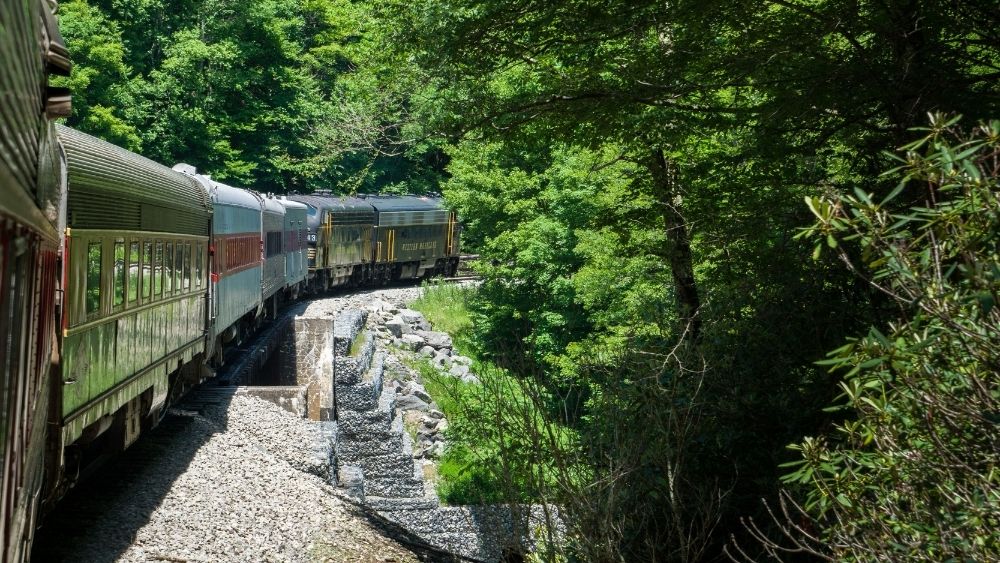
Homebuyers moving to Elkins should touch base with the Homeownership Center, which is a not-for-profit organization and equal-housing lender. It provides housing counseling and homebuyers’ education courses to residents in North Central West Virginia.
As lenders, the Homeownership Center helps families who are first-time homebuyers or any homebuyers who have been previously turned down by another lending institution.
The center also helps eight counties surrounding the Elkins headquarters, including Barbour, Lewis, Pendleton, Pocahontas, Randolph, Tucker, Upshur, and Webster.
The center even has its own Down Payment Assistance Program for anyone who needs help coming up with their down payment.
Check out the full list of homeownership initiatives on offer from the Homeownership Center.
Fairmont-Morgantown
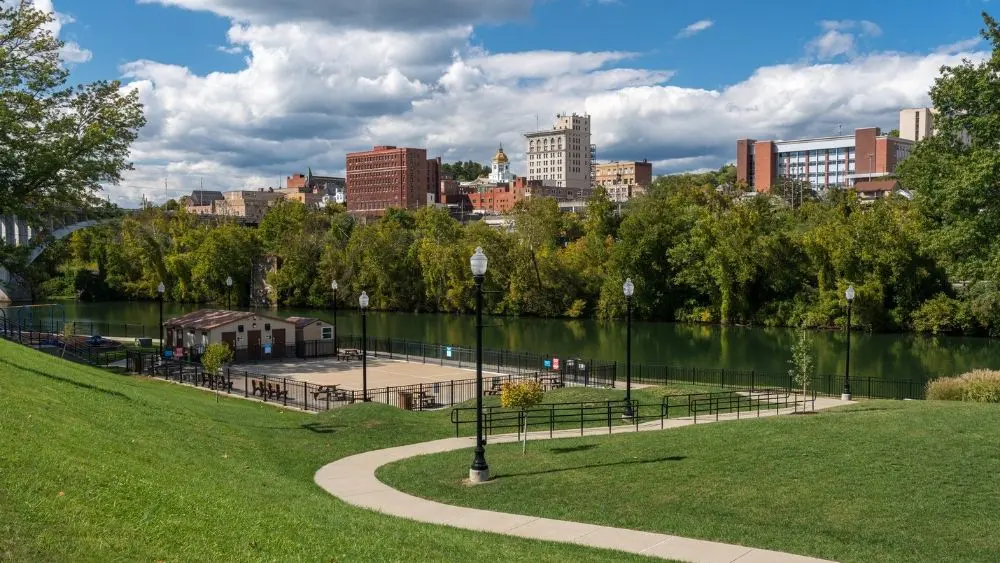
Are you shopping for a home in Morgantown? The Fairmont-Morgantown Housing Authority is a useful resource for any family moving to the region. For starters, it provides free counseling on a variety of subjects, from pre-purchase training, homebuyer education, delinquency counseling, and post-purchase counseling in case you need advice during any step of your homebuying journey.
The FMHA is also partnered with banks, government institutions and private companies so it can help you secure at or below market interest rates. It can also connect you with homebuyer assistance programs that are relevant to your financial situation. You may want to review FMHA’s list of mortgage assistance programs.
There’s also FHMA’s Morgantown Homecoming Program, which provides up to $5,000 in down payment assistance. The cash is a zero percent interest loan that’s forgivable over the course of five years. The funding can be used to buy a single-family home, townhouse or duplex anywhere near West Virginia University.
The program is set aside specifically for any West Virginia faculty and staff wishing to buy a home in targeted Morgantown neighborhoods, including Wiles Hill, Greenmont, Woodburn and First Ward.
Read more about the Morgantown Homecoming Program.
Martinsburg, Berkeley, Jefferson and Morgan Counties
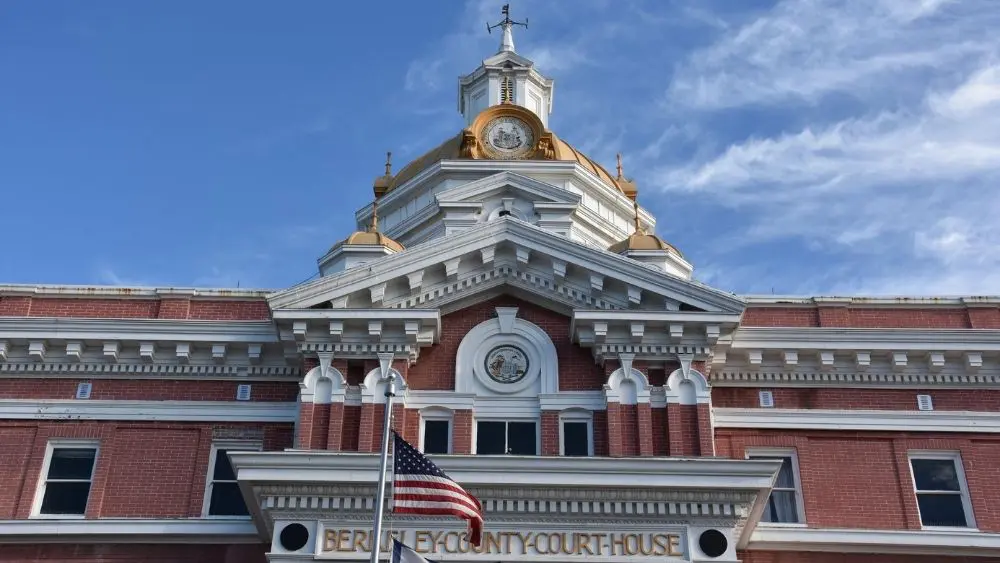
If you’re house hunting on the eastern side of the Mountain State, it’s worth checking in with the West Virginia Eastern Panhandle HOME Consortium, which brings together the regions of Martinsburg, Berkeley, Jefferson and Morgan Counties.
The consortium runs a Homebuyer Assistance Program, providing up to $14,500 in funding to help eligible homebuyers cover their down payment. The loan is forgivable if you use the home as your primary residence for at least five years.
You must be a first-time homebuyer or anyone who hasn’t owned a home in the past three years. The program is aimed at helping low-income households, so meeting income limits by household size is also a major requirement. The home’s purchase price is another priority: existing homes can’t cost more than $185,000 while new homes can’t exceed $238,000, depending on the county.
You must be employed for at least one year with a stable income. The consortium will ask for your tax returns and recent pay stubs as verification. You must also contribute at least $500 of your own funds towards your purchase, and you must complete a homebuyers’ education course.
If you’re interested in the Homebuyer Assistance Program, check out the full details on the city of Martinsburg website. The Eastern Panhandle Home Consortium has a detailed guide and application form to help homebuyers understand the program’s fine print.
Wheeling and Weirton
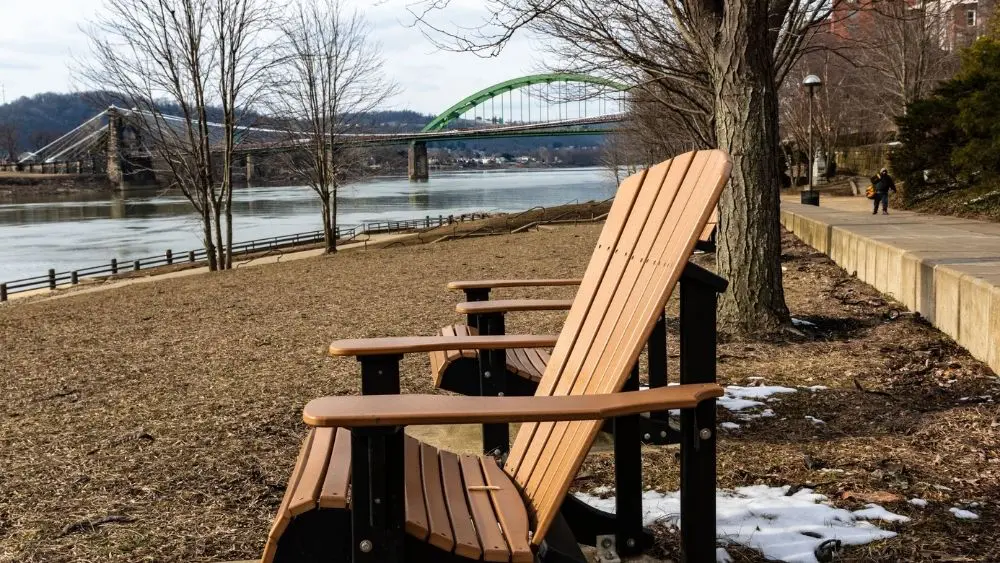
Are you shopping for a home in Wheeling or Weirton? If so, these cities run a First-Time Homebuyer Program, providing up to $10,000 in a zero percent interest loan that’s deferred until you sell or refinance your house. The loan is forgivable and turns into a grant, as long as you live in your home for at least five years. That’s up to $10,000 in free money!
To qualify, you must be a first-time homebuyer, full stop. Annual income limits also apply. In this case, a two-adult household can’t earn more than $35,950 per year.
You must complete a homebuyers’ education course and qualify for a first home loan as a sole borrower.
It’s worth noting this down payment assistance program is available in counties adjacent to Wheeling and Weirton, including Hancock County, Brooke County, Ohio County and Marshall County. These regions share the joint West Virginia Northern Panhandle HOME Consortium, pooling federal funding to pay for this homeownership program.
Read more about the First-Time Homebuyer Program on the city of Wheeling website.
Ready to Buy a Home in West Virginia?
Are John Denver and the country roads are steering you home to West Virginia? If so, get ready to enjoy small town charm, picturesque hillsides, and outdoor activities to your heart’s content. Locals embrace the motto, “mountaineers are always free.”
You’ll also be treated to a variety of housing options in the state’s real estate market. You can shop around for waterfront houses, mobile homes and townhomes, priced from as low as $32,624.
And when you decide you’ve found the perfect piece of West Virginia real estate, there are multiple programs to help you secure your home purchase.
Check out more listings across the state of West Virginia and follow us on social media for more home shopping tips and tricks!
The links on this site were researched by NewHomeSource. This is as cohesive a list as possible. Individual homebuyers should contact entities to fully understand requirements and processes.
Other West Virginia Resources

Carmen Chai is an award-winning Canadian journalist who has lived and reported from major cities such as Vancouver, Toronto, London and Paris. For NewHomeSource, Carmen covers a variety of topics, including insurance, mortgages, and more.
 First-Time Homebuyer Programs in Washington State
First-Time Homebuyer Programs in Washington State